#best author imo
Explore tagged Tumblr posts
Text
i think theres this idea in the general public that the "best" fanfic gets turned into real books like 50 shades of grey. but the truth is that the best fanfic can never be published as an actual book because its intricately woven into the canon material so its inseparable even if you change the names
#no shade (ha) to 50 shades. ive never actually read it so idk if its good#but imo the idea of creating an au fanfic thats so divorced from the original work is boring! why are you even making a fanfic atp#the only good fanfic is when you can tell the author loves the source material and uses it#the best fanfics ive ever read could never be published as actual books because it wouldnt work without the context of the original story
61K notes
·
View notes
Text

Was inspired by Puzzle pieces by @isthatbloodonhisshirt to draw a snowy landscape!
The Hales own and operate a ski resort, the Beacon Hills teens all go on a vacation there but since Stiles has a torn ACL he ends up spending more time with a certain grumpy employee while his friends go on the slopes ;)
Another huge recommendation - I'm a sucker for domestic scenes, 'you're intruiging in a way I can't put my finger on', and who doesn't love a lil' 'sharing body heat to stave off hypothermia'. The way this author writes dialogue and describes body language especially makes all their works a treat to read!
--
(Also - I have more free time on my hands than expected the next while which i intend to fill out with working out and drawing, so feel free to shoot me a request (: and thank you for all the love on my art so far!)
#Teen wolf#sterek#sterek fanart#stiles stilinski#derek hale#isthatbloodonhisshirt#fic rec#I hope I'm not committing any social faux pas with the way I'm linking to the works here!!#Fic has always been my main motivator to draw#and pretty much all of this author's TW works are 10/10 for me#Also the best winter wear is always obnoxiously brightly colored IMO#used to snowboard w the family when i was younger#my art
833 notes
·
View notes
Text
EEEK IM SO EXCITEDDDDD🥳🥳🥳 finals are over and i’m finally free!! i’m heading back home tmr, not excited for the train but i get to play video games and i get to see my little puppy🥰
A Peppermint Tea update!
So. I just want to make it known that while I am slowly working on fixing my older chapters, I have started on the next one, finally! I went through and reread the last like 12 chapters and started to remember everything that I wanted to do to finish off Peppermint Tea. It may seem a little rushed, but I am going to try my best to finish this monster of a fic in the next week or two, so keep a look out for updates! Here is a little sneak peek of this coming chapter!
*note* I still have yet to properly meet Katakuri and the Big Mom pirates, so I apologize if they're out of character!*

He already knew that your lover was Red-Haired Shanks, one of the other four emperors of the sea. Katakuri had not thought it wise for his family to go steal you away from your home, but there was little he could do or say once his mother had an idea in her head. It is then that your words properly register in his mind, and he looks at you, tilting his head to the side.
“They?”
The temperature in the room drops several degrees, and he watches this tiny slip of a woman look at him in pity, but there is a mean grin that paints her lips.
“Yes, they,” you murmur, and Sukuna turns, glaring at Katakuri with oddly familiar golden eyes, “Red-Haired Shanks, and the warlord. Dracule Mihawk.”
Tag list! Hope you guys don't mind still!
Pep Tea Masterlist -> HERE
@writingmysanity @djbumblebee @goth-mami-writer @myradiaz @fluffybunnyu @bookandstar @foggyturtleknightangel @browneyedhufflepuff @anastasiyax @jaguarthecat @atricksterwithwings @black-swan-blog27 @breadedloafs @enpvrirnce @gottalovethefandom
#shanks x reader#mihawk x reader#one piece x reader#peppermint tea#its back bitches!#best author imo#literally so excited abt this#hope you have good holidays/whatever you celebrate!
28 notes
·
View notes
Text
Seraphina and Arlo: The Brainwashing of High Tiers
Exposition:
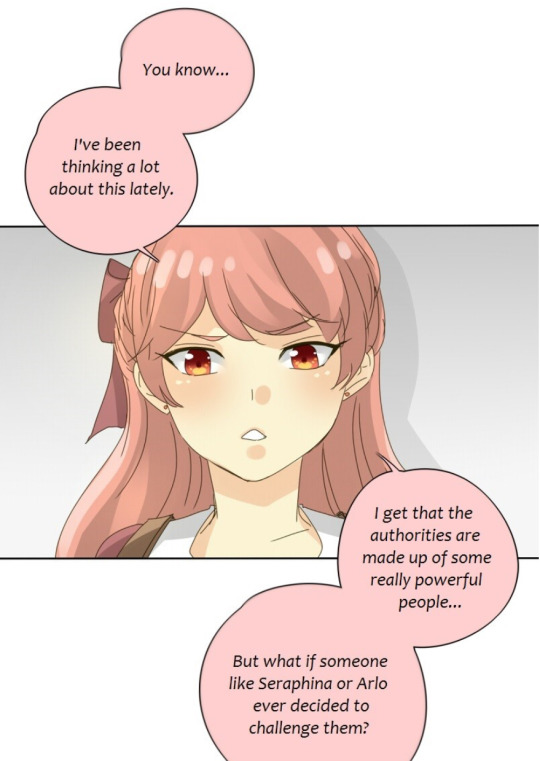


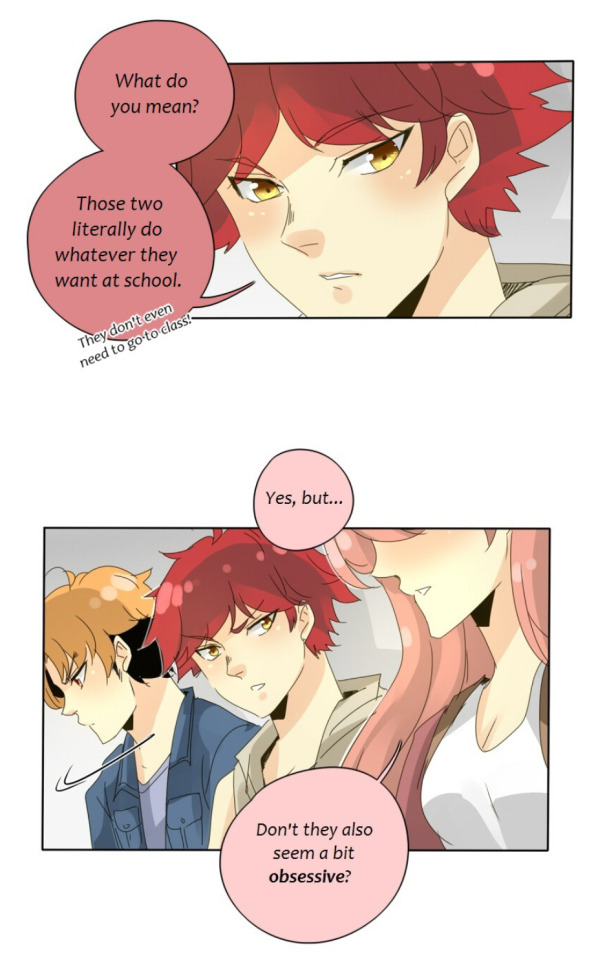
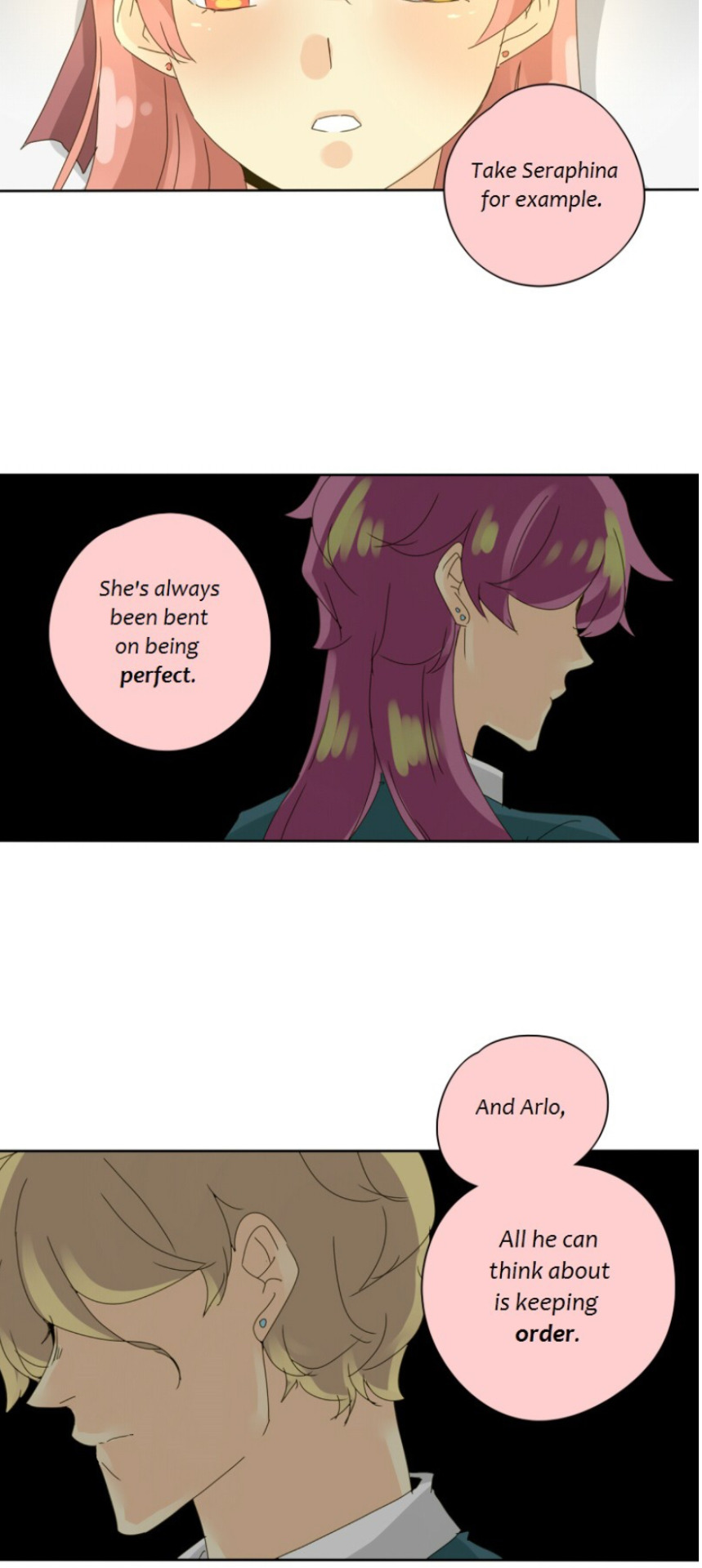
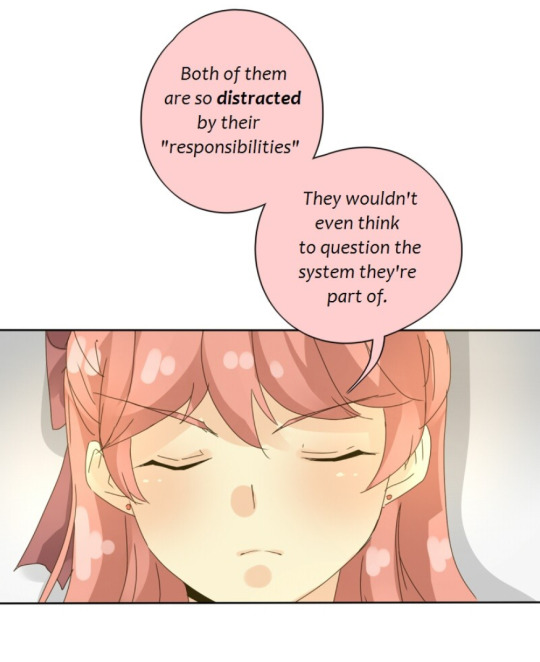
— Remi, Episode 50.
There is a heavy implication that Seraphina and Arlo were raised in much the same way. The pressure on Seraphina comes from her parents, so I’ll extrapolate that the same goes for Arlo. This raises the question: how do the authorities create such a strong societal pressure on such a small percentage of the population? Most high tiers will probably not know any other high tiers besides their parents. Take Wellston Private High School for example: it’s the most prestigious private school around, and canonically has the “highest concentration of high tiers in the region”. There are six high tiers in Wellston. Apply this to god tiers specifically, and there are only three. Not to mention that this current group of students is uniquely strong, even for Wellston. In Rei’s senior year, he was the strongest at 5.8 max.
So much of this brainwashing relies on the parents to do all of the work, and it only takes one or two people to break the cycle. So how are the authorities creating this immense pressure? One tactic could be by isolating high tiers. There is a very widespread concept that one shouldn’t associate with those outside their level range. A caste system like this that affects everyone is much easier to create and maintain than an expectation for a small group, and it also means that high tiers are only being influenced by those who are also high level. This creates an echo chamber. I’ve researched cults and how they brainwash victims, and the first step in the process is isolating them in exactly this way.
But, if there are so few high tiers, how the hell are they supposed be isolated from other groups? The answer is that high tiers are just isolated in general. Take a look at Arlo: his only friend is Remi, and even her, he keeps at an arm’s length. Arlo is only close with Remi in the first place because he was close with Rei, who, at the time of meeting Arlo, was presumably close in level with him. [EDIT: I forgot about Holden, which I think says a lot about his relevance. He is kept at more than an arm’s length and doesn’t seem to have any actual influence on Arlo, let alone a deep relationship. He is also not presented as an equal.] Take a look at Seraphina: before meeting John, she didn’t seem to have any friends other than possibly Arlo. Seraphina and Arlo pre-John seemed to have had more of a professional relationship, and while they were not close in level, Arlo did fit the bill of being a fellow god tier, and strong enough to also be brainwashed.
Now let’s look at Remi. In episode 60, Cecile says to Remi: “And yet here you are... Always hanging around those two monkeys, Blyke and Isen. Letting them treat you as an equal even though you’re in a completely different league.” This struck me as odd because, aside from Cecile herself, the Wellston students closest in level to Remi were Arlo, Blyke, and Isen. And who is she friends with? She actually was doing a pretty good job at following that social convention, unless Cecile wanted to be friends with Remi, which she clearly didn’t. But... her friends were still not close enough to her level. Was she supposed to just not have friends at all? The answer seems to be a resounding yes. Can you think of any genuine friends that Cecile has either?
Friendship simply isn’t considered a necessity for high tiers.
But... why is it that Arlo and Seraphina were brainwashed differently? Creating a societal norm for an isolated group of people is one thing, because those people’s mindsets feed into each other. Putting pressure on individual families to keep them in line, but doing it all in different ways? That would be near impossible. My theory is that Seraphina recieved the typical high tier brainwashing, and that Arlo was raised differently because he was being groomed to work for the authorities. Seraphina didn’t have a set career path planned out for her, but if she’s trying to be “perfect” by the standards of those controlling her, she’s bound to end up going in a direction that pleases them. Arlo on the other hand was specifically planned to become an authority figure. That’s why his brainwashing is so centered on leadership. Also, growing up with direct contact to the authorities makes it more possible for them to customize his brainwashing in this way.
But does all of this apply to high tiers in general, or is it specific to god tiers? Let’s take a look at the high tiers in Wellston. We have Seraphina, John, Arlo, Terrence, Remi, Cecile, and Blyke. John is a unique circumstance because he wasn’t raised by high tiers, so we’ll cross him off the list. Terrence was also unique, so we can cross him off as well. Remi was different from the norm as well. Why is that? Well, Remi actually wasn’t raised by high tiers either. Rei said on screen that both of his parents were elites. We can cross Remi off. Blyke doesn’t fit the bill either, but that’s easy to explain. He was an elite for a large part of the story, and he shot up rather quickly. We don’t know much of his family, but he probably wasn’t expected to be a high tier at all, and was raised as an elite. (All of this also serves to emphasize how much of this brainwashing comes from a person’s parents.) That leaves only Seraphina, Arlo, and Cecile to look at.
Cecile does seem to have high tier brainwashing, but it’s not nearly as intense as with Seraphina and Arlo. She doesn’t seem “obsessive”, and she wasn’t one of the examples Remi mentioned in chapter 50. It’s clear that high tiers are brainwashed in general, but god tiers are kept on a much shorter leash. This makes sense, obviously, because keeping a population in control like that is less necessary the lower the level. However, it’s also a chicken an egg situation: god tiers are both more important to keep in control, and also easier to keep in control. It’s important to note just how many exceptions we had to cross off. People like Remi and Blyke aren’t actually that unusual— a lower leveled high tier is much more likely to have non-high tier parents, or to have not always been a high tier themselves, or just in general, to have way more day-to-day interaction with non-high tiers. The brainwashing gets more and more diffused the lower down the ladder you go.
#UnOrdinary#Arlo UnOrdinary#Seraphina UnOrdinary#no one else is really relevant enough to tag tbh#analysis#in this world the best thing to be is an elite imo#high tiers and low tiers suffer the most from this system#and elites have it better than mid tiers#so you’d probably have the best time as around 4.6 ish#upper elite but not too close to high tier#Ngl the isolation of high tiers is rlly sad#no wonder sera latched onto john like that after her character arc#makes me think about arlo and rei also#Ouch#there are more high tiers in the story i could’ve looked at but this wouldve gotten really long if i extended past current Wellston student#I did not know I had this much to say until I started typing#I was coming to conclusions as i was writing like#“Omg THAT explains what I was wondering abt w/ Remi and Cecile!!!”#Now i still don’t know how the authorities would go about creating these societal expectations to begin with#so I’ll leave that open ended#propaganda? Idk#Ykw should i tag remi too? Maybe i should tag remi#she’s kinda important here#remi unordinary
119 notes
·
View notes
Text
I am way too tired/jetlagged to make this post right now, but the reason Armada Starscream is so specifically well done to me actually isn't just the way he's got more depth than just wanting to take over Megatron. It's the way he falls back on this image he has of himself as someone who is solely focused on Megatron. And he is obsessed with Megatron, but the disconnect between Starscream and his image of himself is what gives him actual depth.
The reason this is so cool to me is like, that self-image--that he is single-mindedly obsessed with Megatron and will sacrifice everything else for that goal, no matter who gets hurt--is pretty close to what every other Starscream is. (The selfishness you associate with Starscream is a little more subtle, but it's there in the "no matter who gets hurt" clause imo.)
So if you go into this as a Transformers fan, you're already expecting Starscream to betray Megatron and try to best him and rule the Decepticons. But so does Starscream, even when he's demonstrably proven to both his peers and the audience that he's more than that. It's almost like his past incarnations--or the audience's expectation of him--haunt him. It turns his own internal man-versus-self conflict into this really cool man-versus-narrative conflict.
And what's crazy about this is, through the last moments of this arc, Starscream does grow beyond the narrative we'd expect from other Starscreams! But he never admits that to himself, because it's easier for him to cling to the idea that he's laser-focused on his hatred of Megatron. Every time he helps the minicons--every time he helps the humans--even in his last words, he LIES to himself and everyone around him that everything he did was always about Megatron. Because it's easier to simplify himself than to grasp that he might be a complex character. Because he's a person and he has all the messy conflicts that come with that. He falls back on the same ideas every single other Starscream did, and THAT is his undoing. Not that he is self-centered because he's Starscream. Not that he is obsessed with Megatron because he's Starscream. That he THINKS he is all of those things and he will not LET himself be anything else.
I would argue that that's a bigger theme in Armada, as well. Optimus and Megatron more or less spend their final fight coming to terms with their story roles in Transformers. I really feel like if you sneezed on them, they would realize they do this in every universe and in every timeline. Starscream's is the most interesting example to me, though, because he's such a departure from other versions of Starscream; hell, he acts (and looks, lol) a lot more like some incarnations of Thundercracker. But he's still got classic Starscream in him in this roundabout meta reference. He's like an homage to his namesake. It's so cool! And it works perfectly with the story he's a part of.
#transformers armada#armada starscream#so. this part goes in the tags but. if you know me or recognize my url you may be going ''half life fan take''#especially given that this is by far my favorite starscream that i have ever seen#I am beating zero half life/valve gaming allegations with this one#but imo this is a reminder to me that like. the best meta media is always the kind that doesnt shout it out#i mean. generally the more you have to handhold your audience on what the media is about. the more it is bad#unless it's specifically really dialectal media aimed at young children and the directness is like. The Point#(wild robot being a good example of very obvious media meant for kids that is still clearly like. fantastic)#but in general i think meta media (metagames and the like) kinda lose their impact when you have to explain them#people forget that half life doesn't really hold your hand about this#because valve games are so entrenched in internet culture#it goes beyond ''the one free man'' as an icon - the game is about the horror of being a video game player character#and especially of being a silent protagonist#gordon's helplessness in the plot and the way he's ''the one free man'' but not free is a commentary on how games funnel you through their#stories while acting like the player character has any agency#gman's ability to teleport players around various environments and even to/from stasis is similar to how gamedevs load/unload characters#and teleport them around cutscenes and environments when the player cant see them#he gives them just enough freedom to feel natural while keeping tight control over their purpose in the story he is telling. like an author#SIMILARLY. this is why you can't do myhouse.wad again#part of the horror of myhouse.wad is the familiarity of it and the subtle offputting changes from standard doom mapping FOR DOOM PLAYERS#even down to how it was released#it isnt just a silly meta internet horror game everything about it was purpose-built to send goosebumps specifically to doom modders and#classic doom enthusiasts#ANYWAYS. ARMADA IS LIKE THIS TO ME#behind all the anime nonsense and the like 20 filler episodes in the start there's a genuinely clever commentary on like#transformers as a franchise and as a story that keeps getting retold#THERE'S MORE TO IT THAN THAT BUT YOU GET MY POINT.
36 notes
·
View notes
Text
I finished another masterpiece of a fanfic that has been left unfinished since 2022. What type of divine punishment is this? Seriously I'm learning to write fanfics just so I can give them a proper ending
#btw this was one of the best zikki fics that i read ever#and the author is brilliant imo#fanfica#ffnet#ao3#archieve of our own#fanfiction#writing#works#h2o: just add water#rikki chadwick#h2o just add water#zane bennett#zikki#h2o
10 notes
·
View notes
Text
i was reading a gallavich fic and i wasnt really loving it but i was still reading it and then… BAM! debbie slander, just like that. and of course, it had to come from mickey, who is of course, a known debbie hater.
(below are screenshots of mickey looking at the girl he despises so much)




#they’re literally best friends like what#you don’t need to slander debbie just because you don’t know what to write#but seriously mick and debs are one of the best duos imo#esp in 5x11😭#shameless#mickey milkovich#debbie gallagher#gallavich#shit post#i don’t want to say the fic because i don’t actually have anything against the author#and whatever write what you want to#i’m just sick of the misconception that mickey hates debbie when in reality she’s one of his favorites
116 notes
·
View notes
Text
i reread one of my own fics and ngl it made me miss the late 2010s bruins so so badly 🥲
#danton getting traded february 2020 was when the timeline shifted to the bad place imo#also this is probably the best fic i’ve ever written#even i the author had such a great time rereading it lmao#literally reading it like ‘did i mean to use dramatic irony as a subtle commentary on the way men navigate friendships’#…i probably did? but don’t remember thinking about it consciously#might fuck around and de-anonymize it even though i was going to keep all my hrpf fics anon until it’s no longer my most prolific fandom#(the fic being a lesson in bjorkisms)
4 notes
·
View notes
Text
@bunniesandbeheadings I might misunderstand the text you linked. How could Mary call Edward a bastard? KoA was dead by then, and of course widowers can remarry. Calling Jane a legitimate Queen in no way would take away KoA’s status as Queen?
all of hviii's marriages after catherine of aragon were not recognised by the catholic church/pope. when he needed dispensations for these marriages, like for affinity (his marriage to jane was one of them), they were granted by the anglican church, whose authority the pope and other catholic monarchies of christendom did not recognise (the last real 'papal' henrician appointment, irony of ironies, was thomas cranmer's). there was also the matter of all marriages taking place when the realm was in schism, thus "all other women of henry concubines and not wives". prince edward was (legitimate) heir as reified by parliament; both retroactively from the succession act of 1536 and in name by the one of 1543.
foreign dignitaries of course, when they visited, would honour whoever henry's wife was as queen to maintain good relations and as matter of diplomacy (this wasn't, of course, done by the imperial until the last weeks of AB's time as queen, but otherwise, she was, even if 'frostily' by the french as in 1534). but they were often under instruction to treat this status as transient, as lauren mackay has summarized in her biography of chapuys, for example, charles v was rather mercenary in his attitude towards jane seymour, continually referring to her as henry's 'mistress' well into their marriage in his own instructions to chapuys:
"It appears Charles [V] was at times rather ruthless in regards to Jane, despite the fact that her being in power benefitted Mary. Charles referred to her in several dispatches as Henry's mistress rather than queen [...]" Inside the Tudor Court, Lauren Mackay
#bunniesandbeheadings#replies#there's like the question of why mary did not attempt to overthrow edward while he was king if she didn't believe his reign was legitimate#which is an interesting one...#but 1) her biographers really discount how much of a dissembler she was#2) loades theorized that she actually did buy into the henrician supremacy and her own illegitimacy and simply had a turnaround once#edward died believing that was god's sign she was the rightful heir thus legitimate...which i find an oversimplistic explanation. to say#the least...#i think psychologically in the last years of the edwardian regime she had something of a redeux of the AB years?#this belief england was going to fall into perdition due to 'evil councilors' but she couldn't do anything to reverse it#which is why there's an escape attempt not just an escape plan as in the former but she also decides against this in the last hour#so yes. what was her plan? or hope? it might've been that edward vi would be excommunicated as he reached his majority#and that charles v took up the call to invade and england became one of his dominions#and she would be set up as regent as he set up his other female relatives as regent in his absence#idk if i'd say jane being in power benefitted mary. all the 'benefits' she received came from her swearing to oaths she'd been pressurized#to swear to for the past two years...?#anyway this was illuminating and instructive. to me. it best explains imo why she took such a defiant attitude towards edward. she wouldn't#have seen it as defiant if she didn't believe in his authority in the first place
12 notes
·
View notes
Text
genius archer's streaming is actually a much more fun read than i was expecting and handles the disability aspect better than i thought it would
#i wasn't expecting to like it much since it's a Genius concept where he's just like. super good at whatever he does#and usually those kinds of plots are boring at best and annoying/obnoxious at worst#but they still manage to keep it Entertaining without being Annoying so it's doing a good job imo#its not a very deep series but it also doesn't feel entirely shallow and it's fun to read#i think they could be doing a bit more with the disability thing but thats coming up more in this new season so we'll see!#if they keep approaching it as they have been it think it'll be handled well. fingers crossed haha#some people may feel differently about how the disability is being handled since his game character is perfectly abled but like#its not like he's magically cured he's just found a different path to aim towards (pun intended) that is accommodating to his disability#we do still see how it affects his day to day life#and how its impacted (and continues to impact. both negatively and positively) his relationships with other people#(and its becoming more of a focus again in this new season as i mentioned earlier. ive got some hopes for how it gets handled)#plus. keeping in mind that he's someone who has an Acquired disability and not one he was born with#AND who's long term goals were sports oriented#it's just like. super common and realistic to feel the way he does. no two disabled people are the same u feel#and the way it's portrayed is like. so#regardless of how the character is feeling about their disability. it's really obvious when the author themselves looks down on disabled pp#it is very clear when the writer themselves does not think a life with disability is worth living. lol. lmao.#this does not feel like that At All despite the mc having negative feelings about his own disability#this simply feels like a character written navigating his own experiences with Becoming Disabled in what was a genuinely traumatizing way#and finding a New Goal/Dream and something he still wants to do while living with his disability#its not Perfect ofc but nothing ever is and i can tell it's trying to be genuine and respectful about it so thats a thumbs up from me#beso babbles
1 note
·
View note
Text
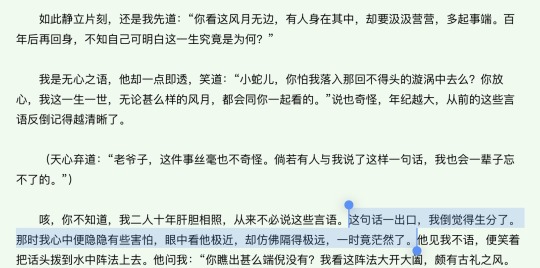





《我的一个朋友》 by 孔恰
#kongqia has the best prose of all the dnmei authors i’ve read so far imo#简明雅致又绵延 意犹未尽#以已垂暮之年的马小蛇的叙述来展开故事是个很���的写法 从百十年后再回忆那些往事 感情就没那么撕心裂肺了 只是淡淡的怅然所失#于是读者们会如温水煮青蛙般地陷入平淡的讲述中 最后被虐得半死 尤其是结尾那段简直是神来之笔平地起雷 云淡风轻却句句锥心刻骨#explicitly or not it’s about three different unfulfilled loves: 马小蛇->丁若望->苏方宜->沈姿完 (who is dead long before the story even begins)#丁若望明知自己被算计被利用被当替身了 还是心甘情愿地给自己套上枷锁 一头扎进柔情蜜语编织的天罗地网中 往日的仗剑江湖快意恩仇再不复见#即当上武林盟主又做了朝廷大官不失为一番佳话的他至死还是对那位“沈郁”公子念念不忘#看似是苦苦一生求而不得 可他又说了那句“下一世 还要更糊涂 不让他算得那么辛苦” 或许也是求仁得仁吧#而马小蛇就更悲了 本该是主角却沦为旁观者#把一切都看得透透的却说不出走不了劝不动 只能眼睁睁看着自己心爱的人飞蛾扑火般地越陷越深 与他渐行渐远#悲就悲在当他开口讲这个故事的时候 丁若望和苏方宜的坟头上早已杂草丛生了#即便他有手段使人心不烂肉不腐 每到中秋还去他的坟前夜哭一回 人死万事休 再肝肠寸断的思念也只能永远烂在肚子里了#他从始至终没说过一个字 夜里拆招 大漠挡剑 走过长墙的时候都没说 这一辈子也不会说了#听完故事后的天心弃说他“没有一天开心快活” 可那十年与君浪迹天涯闯荡江湖又算什么呢?#又想当年春光那样好 两个笑得得意忘形的少年走过长廊 他静静望着那个可以管上��十年的笑容 加快了脚步#也许感情这件事只不过是甘不甘心 情不情愿罢了#all that to say it was very much my kind of story ^_^#r
3 notes
·
View notes
Text
I'm really realizing that my biggest ick in books is when man / woman / any gendered term is replaced with "male" and "female". Typically I see it used in romances with non human characters but like. Are you really dedicating yourself to "yes these angels/vampires/fairies/were-whatevers have a sexual binary that humans TOTALLY have but dont call them man or woman! bc they're not human!"
#the book i just read had all of these in story btw#they NEVER want to have any fun with it its just sexism#its very 'noooo theres no trans or intersex people here- yea theres gay people but NOT LIKE THAT'#vibes wise to me#completely Trying to sidestep gender and then slamming face first into the idea that sex is a binary#i tried mentally replacing male / female with 'normal' gendered terms and it did make the text feel less weird#which is such a shame for the book i was just reading - i think it had a solid story aside from that weirdness#yea the power of love and friendship is all powerful HOWEVER#im not shocked when other books do it bc its pretty explicitly straight to start with - but when authors are trying to shake stuff up -#-with gay characters it comes off as. lets say disingenuous at best#its shitty as a trans person bc theyre trying to dodge the gender convo but worse to see people hammer down on sex binaries#we have four chromosomes & intersex people are as common as redheads in the us#this isnt a hard concept for a novelist to wrap their head around imo#slipspeaks
4 notes
·
View notes
Note
no because i read the first like, four chapters of the outlaws webtoon and was immediately like "haha, no?? why is jay acting like bruce never thought of him as his son? why does this author have it out for b so bad?". i'm glad to know i made the right choice if it just got worse
I could understand the ‘wow, I guess I never really found a family with Bruce if this is just always how it’s going to be with him’ mindset, especially if Bruce was being particularly cruel with him.


[ Batman and Robin #20 (2011) ]
He can be cruel. Exploring Jason’s thought process, how he resolves this in his mind and comes to forgive Bruce again and again is something they could have at least touched on. Instead, they not only did nothing new to move the disagreement forward, but they also muddied it further, in a bad way. If they want to complicate (or worse, attempt to resolve) Jason and Bruce’s decades long conflict, that should be a separate comic entirely.
They could have just had Jason cut Bruce off completely (even if temporarily) with the set-up they had, but they did nothing with it (even though they could have avoided the mess they made if they took this route).
Bruce again does something unforgivable to Jason (but now his friends get fucked over too), only for there to be a half-assed make-up conversation that didn’t really address the real issue, and then there’s no further mention of it. Bruce put the outlaws in a simulation for months without their knowledge, and the conversation Bruce had with Jason later wasn’t even about this. Screw Artemis and Bizarro, I guess. They’re expendable because the core conflict is actually about Jason and Bruce.
I wouldn’t say the bad Brucie moments are too ooc based on how he is in canon. The abuse, and him being big on mass surveillance/never trusting anyone while being the one to repeatedly betray other people’s trust. It’s just all the other characters being so tolerant/accepting of his actions is kinda funny, it’s almost like they’re NPCs lol. But also again why are Bruce’s trust issues which cause a strain on his relationship with Jason a main theme in the outlaws book lmao
Ultimately what this webtoon did was take every irritating plot from Jason’s canon appearances, amplified them tenfold, and mixed in even more unresolved plotholes and horrible mis characterizations.
#if I complained about how ooc Jason was in this this post would be 7 pages long#i mean just the Jason almost killing two face as robin incident alone was framed in such an incorrect way#i just accepted the fact that the author has a poor understanding of Jason’s character and that’s fine because this isn’t canon#look. imo the outlaws work best as a fun adventures type story#the outlaws stuff has no reason to mix with Jason and Bruce’s ongoing disagreement on their moral stances.#attempting to mix the two was a very weird and bad idea??#especially when they very evidently had no idea how to deal with the aftermath of it#i mean Artemis just lovingly told Jason to go and try to apologize to Bruce#after he practically studied her under a microscope for three months#you know this woman is on par with Diana Prince right? 💀#and why did they have Biz talking backwards again 💀 it only makes the confusing plot even more dizzy#there’s just too much wrong with this one lol#asks
14 notes
·
View notes
Text
finally reading jessica hoppers book of muisc criticism because the idea of being locked in some sort of personal sense of disagreement which inspires thousands of words on my end without reading more than one piece of her writing is so deeply embarrassing to me. anyway i love music so much.
#about 100 pages in already and i love work that challenges u to think deeper about art but also you dont exactly align with the author#its really fascinating to further contextualize her work and to give her credit outside this one piece which shes exhaausstively attached to#in ways that limit her continued existence as a critic whose honestly at her best Not writing about emo imo#which is just further disappointing :/#ANYWAY#im having fun :))#my posts
5 notes
·
View notes
Text
god i rarely write chubby!reader fics because my fics by default dont include any (intentional) descriptors to paint reader as thin or fat or any race so that they're accessible for everyone. but i saw some absolutely rancid takes and i lowkey wanna write another multi-part chubby reader fic. i should finish some plans tbh
#wooahaes.txt#i dont know who needs to hear this but... the existence of chubby!reader fics does not take away from other body types representation#a lot of fics default to having a thin reader most likely because the author is writing from their own experience.#there's literally nothing wrong with that as long as the author puts a warning on the fic for specifying a body type#like imo you can really write anything you want as long as you put the proper warnings in place so that readers can pick and choose--#--what they want to read yknow? not everyones gonna relate to a fic and thats okay#its the same thing as reading published books with a protag who best resembles you#nothing wrong with looking for the rep! but its not like its taking away from 'other' ppls rep to have a plus size protag#and so forth! but genuinely like... a lot of reader fics default to having a thin reader#my works dont and i have mutuals who write in a similar manner (and i love them v much for it mwah mwah)#and they typically dont have any warning that reader is written to be thin. we just kinda have to see it for ourselves and usually click of#its why i try to be careful in tagging my works accordingly so people know what they're getting into#anyway thats enough rambling. i'll eventually come back around and write another chubby!fem!reader fic#i have a chris one ive been thinking about for a whiiiiile now and its got some very cute moments teehee#i'll try to have an alternate fic being uploaded around the same time too for ppl who arent interested in a chubby!reader fic tho! <3
5 notes
·
View notes
Text
Fic recs!

Din Djarin x f!reader, Western AU
Rating: Explicit (COMPLETED)
Summary: Set in a brothel in the late 1800’s in the Wild West, you’ve only been working there for a month when Din Djarin shows up. A bounty hunter who makes stops into town between jobs, he is known at the inn for his generous appetite and demanding preferences. Asking for you one night, he is pleased to learn you are well suited for him: your sweet nature soothing to his gruff temperament and surprising him with your ability to handle his rougher tastes. Demanding that you be made available to him every time he is in town, neither one of you is ready for where this request leads.
Chapters:
The Beginning
The Kid
The Surprise
Drabble: The Union Suit
The Hill
Drabble: The Henhouse
The Lesson
Drabble: The Rope
The Rope, Part II
The Night Trip
Interlude: US Marshal Marcus Pike
The Camping Trip
The Confession
Drabble: The Worship Service
Interlude: Oil Baron Maxwell Lord
Interlude: Ranch Owner Jack Daniels
The Demand
Interlude: Pioneer Francisco Morales
The Kerchief
The Mark
Drabble: The Exploration
Drabble: The Letter
The Ask
The Hour
The Crest
The End
One Shots:
The Hayloft
The Night
The Bath
Bound
The Morning
TMTC Art
Western Din Djarin
The Union Suit
TMTC Din
TMTC Din, II
TMTC Din, III
TMTC Din, IV
TMTC Din, V
Din and The Kid
Din and The Kid, II
Take Me To Church story gifset
Moodboard
Moodboard II
Moodboard III
Moodboard IV
Din and Girl
Din in the bath
Love Letter to TMTC
Gracie
Gracie II
Gracie III
The Ending
TMTC Comic
TMTC Drabbles
Drabble Masterlist
Tags:
#tmtc inspo
#tmtc ask
#tmtc art
#tmtc drabble
#@/frannyzooey is one of the best fic authors on here imo#some of the most tender-hearted feelsy vibey filth#so much A+ quality smutt and smuff and smungst and everything in between#read it as it came out over the years and come back to re-read from time to tome#gotta start appreciating stuff like smut on here#support your writers peeps#it's that simple#din djarin#pedro pascal#pedro pascal fics#fics#fanfic#pedro pascal character fics
1K notes
·
View notes